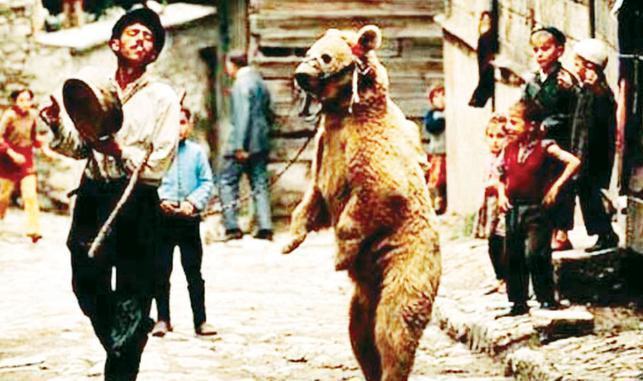Bears tortured to dance rescued, taken under protection in Turkey’s Bursa
Gülden Aydın – BURSA


The Ovakorusu Bear Shelter, located on an area of 110,000 square meters in Bursa’s Karacabey district, has been a home for at least 70 bears for 24 years. The shelter has a yearly budget of 200,000 Turkish Liras and is provided by the Forestry and Water Affairs Ministry and the Directorate of Natural Protection and National Parks.
Among the rescued bears, four of them, named “Roger,” “Persie,” “Ahmet” and “Ramazan,” stand out in the shelter as they carry marks of brutal torture on their bodies.
For many years bears have been tortured for entertainment purposes in Turkey, especially by Roma people who force the bears to dance to tambourine music in city squares in different provinces across the country to earn a living. The four bears were the latest victims of the forced tradition.
The bears are rehabilitating in the shelter with the aid of vitamins, proteins and carbohydrates pills. They are fed at least 400 kilograms of food per day, corresponding to 146 tons a year.
In 1993, the first batch of 12 dancing bears was taken into the shelter. Later the number of rescued bears increased to 64. Most of the dancing bears across Turkey have been rescued and brought to this shelter.
Officials from the shelter said the dancing bears had forcefully had their tooth and claws extracted by former owners for the purpose of preventing them from harming humans and properties, making it impossible for them to live in their natural habitats.
Yüksel Aydoğan, the head of the shelter, said the bears’ life expectancy was between 25 and 30 years, adding that they were trying to extend it with intensive care in shelter.
“Bears are very good climbers. So they can break and topple some trees while they are climbing it,” he said.
Aydoğan said they knew the names of all the bears by their caves, while pointing to a cave that belonged to Persie.
“Persie made this cave by himself. Bears which are living in this shelter move to their caves even if they do not have to hibernate. They don’t go on winter sleep because Bursa has a mild climate and they have enough food,” he added.
İbrahim İbir, another staff at the shelter, said other bears in the shelter were showing respect to the four dancing bears because of their old age.
“The other bears are respectful toward the four older dancing bears. They do not disturb them. They share their food with them because they know older bears move slower,” he said.


Roger is the oldest bear in the shelter. He cannot bite on food with his teeth, so instead swallows them.
İbir said Roger had two bruises on its nose because its former owner pierced rings on its nose on the two sides.
Officials stated that the shelter has been closed to visits since 2014 after some visitors mistreated the bears. They said some visitors played music from their mobile phones and forced them to dance.
The bears are captured at a very young age and are forced to walk on fire and learn to dance by abuse. Bear dancing is an old tradition and has a brutal and painful “training” process.
